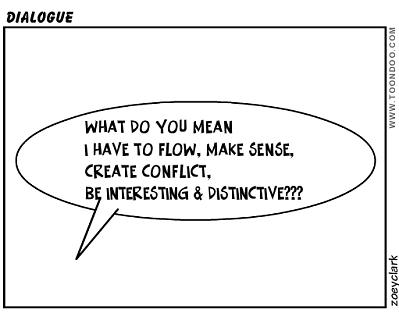“Good dialogue clearly conveys emotions, attitudes, strengths, vulnerabilities, and so on, while revealing the details of your plot and advancing your narrative.”
Susan Kouguell, from her article Tips on Writing Dialogue That’s Truthful.
Dialogue is one of the hardest parts of screenwriting. Just look at its functions perfectly stated by Susan Kouguell. Good dialogue needs to do all that.
And what does good dialogue mean?

- Good dialogue flows.
One way to assure that is by not writing on-the-nose dialogue.
But if it’s never on-the-nose, then you’ll also bore your audience to tears or annoy the hell out of them.
Think about five characters who never ever say what they mean and never mean what they say for 90+ pages. Frankly, I’d end up wanting to strangle them. There have been many movies where I hated the characters for this reason.
However if it’s always on the nose, then you’re destroying your chances for conflict. Also a no-no. It’s a hard balance to strike.
Thanks to some great feedback, I (mostly) dealt with my tendencies to write on-the-nose dialogue. In my defense, I don’t want to eliminate it completely because it’s not realistic then either.
Because people who do mean what they say and say what they mean, at least more than half their lives exist. Exhibit A: Me. I might have to get a little diplomatic or more polite depending on the situation, but if something is wrong, I never, ever say “nothing.” And if I’m upset or not happy about something, I never say “whatever.” Yeah, I’m weird like that.
- It needs to be fresh. Witty is great too, if you can pull it off (and it fits the mood).
You can’t write a page-turner by putting the same old clichés everywhere. But then again, it should also sound natural.
All the freshness and wittiness in the world can’t save your script if your character doesn’t sound like an actual person. (If it’s not an actual person, say a robot, an alien from another galaxy or some other special circumstance, never mind.)
- And perhaps most importantly, your characters should sound distinctive.
Now, it makes sense. Because in reality, we all have unique speech patterns, our preferred catch phrases, speed, ….. The list goes on.
That said, I’ve always found it easier to “separate” the voices for people who are from different backgrounds. Because the more different they are, the easier it’s to write lines that sound unique to that person.
Think about Pirates of the Caribbean, for starters.
Jack Sparrow: pirate, eccentric, (a little) nutty, morally ambiguous, witty, male.
Elizabeth: a young lady with a free spirit. She’s also well-educated and brave.
Norrington: soldier, by the book, with a distaste for outlaws, not usually able or willing to think outside the box.
How hard can it be to write their lines (and how they speak those lines) so that they are distinct? Making the lines funny and/or smart enough can be the challenge here. But differentiating characters’ way of speaking? Not so much.
The Biggest Dialogue-Writing Challenge in Screenwriting
So what is, at least for me, more difficult than writing dialogue that’s not on-the-nose, fresh and that hopefully flows?
Making my characters sound distinctive, when their backgrounds and life expectations aren’t so different.
What if your story has to have characters of the same background, identifying with the same culture, who are from the same part of the city, who are of the same sex and age?
When writing dialogue for such characters, I rely on their actions and how they respond to situations. I take advantage of their favorite words/catch , how often they swear (or not) and their personalities.
But what I often find, just not within my own dialogue but within others’ as well, is that I can identify characters according to what they say and their actions, rather than how they say their lines.
As I work on my skills to create more distinguishable dialogue, I asked some of my fiction writer friends how they handle this. Their responses are below:
“Physical actions are good. I like those more than catch phrases — not sure the preference of my readers, but I like them more. Having one start, then stop and think, then finish in a different direction is my favorite separator – equal to the guy who doesn’t reply for longer than is comfortable.”
“People tend to use certain words (slang or otherwise) more than others or have quirky habits- how they stand, twirl their hair etc.”
Anna Marie Spackman:
“I always think of motivation. My best friend and I may sound similar or say similar things, but we are motivated by different things, so the way we respond to a given situation will be different.”
***
We started with a quote from Susan Kouguell, so let’s end with one from her.
“Readers should be able to identify who is speaking without needing to read each character heading. Characters’ voices must be distinctive and not interchangeable with other characters.”
Susan Kouguell, from her article Tips on Writing Dialogue That’s Truthful.
*
Yep, no one said being a screenwriter is easy. How do you handle your dialogue? How do you ensure your characters’ voices are distinctive?
Must-Read Helpful Articles on Dialogue
Column D: Writing Dialogue -The Nose Knows by Drew Yanno
6 Reasons Dialogue Is Your Enemy by Lucy V Hay
Tips on Writing Dialogue That’s Truthful by Susan Kouguell
Dialogue Is The Least Of My Problems by Lucy V Hay
Wendy’s LA4HIRE: Best Screenwriting Tips for Great Dialogue by Wendy Kram
More Than Words: Screenplay Dialogue by Lucy V Hay
Script Mistake # 4: Fatty Dialogue by Lucy V Hay